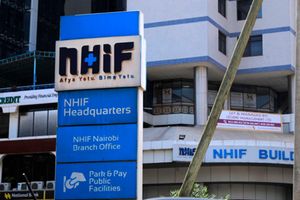Explained: Kenya new health plan replacing NHIF

Social Health Authority Chairman Dr Timothy Olweny.
What you need to know:
- Dr Timothy Olweny, the authority’s chairperson, says this fund will be funded by the Exchequer.
- Some of the services under the kitty will include patient care and post-natal care.
Come July 1, 2024, you will access healthcare services under the new Social Health Authority (SHA), which has three distinct funds.
The kitties are the Primary Healthcare Fund (PHF), the Social Health Insurance Fund (SHIF) which is the equivalent of the defunct NHIF, and the Emergency, Chronic and Critical Illness Fund (ECCIF).
To put it in perspective, registering for SHIF grants you automatic access to services offered under the Primary Healthcare Fund.
Dr Timothy Olweny, the authority’s chairperson, says this fund will be funded by the Exchequer.
Some of the services under the kitty will include patient care, post-natal care and screening for non-communicable diseases.
What this means is that if you register for SHIF but don’t make any remittances, you will not be able to access curative treatments.
The Nation spoke to Dr Timothy Olweny on matters registration and SHIF deductions, and here are his responses:
- With barely three weeks to the start of SHIF deductions, isn’t time running out, especially now that it is a fresh registration process?
We intend for the registration to be simple. It's going to be one of those where you can use your smartphone, a USSD device, or go to a cyber café.
The only part that is going to require your physical presence is for capturing biometrics.
Even if you have not registered by July 1, you should be able to complete registration before accessing care at the health facilities.
- Can one register on behalf of their elderly parents or other relatives?
No. The registration processes for individuals who are unable to complete the process independently are typically handled by authorised agents, such as Community Health Promoters (CHPs).
- Will any existing information for members previously registered under NHIF be used during the registration process?
Remember, you are giving us permission to be able to do that then we populate it as you go along.
Every step you are permitting us to be able to access your data because the mere fact that the data is present in NHIF doesn't mean that SHA can go and access that information because of data protection.
- How soon will informal workers know how much to contribute to SHIF after registering?
Ideally, the SHIF registration process would use a means-testing tool based on your answers to questions to determine your contribution amount right after registration.
However, verifying income for informal workers is difficult.
Because of this, the system currently relies on you to give accurate information during registration. I know it’s not perfect but it’s the best system we have now.
- What happens to individuals who have made advance NHIF payments?
Any advance payment becomes a liability to SHA. This means that we are going to prorate your premium up to the end of this month.
Once your new contribution amount is determined under SHIF, these advance payments will be deducted from your future contributions.
You will only be responsible for paying the difference between your contribution amount and the remaining advance payment balance.
- Some Kenyans say that their organisations have already started making these SHIF deductions...
If this is happening, that's an error. The same approach applies, the monies already paid will act as an advance payment, and therefore they should get credit to that effect.
- Will there be new cards or how will Kenyans continue to pay to access their benefits package?
Those registered will get what we call a social health authority number. Anybody who is under 18 will get a minor social health authority number.
There will be no physical card and you will access the service based on your identification and that number.
- Polygamous spouses…what’s in for them?
The programme focuses on registering households, not individuals. The issue of polygamous families has been a contentious one.
But in essence, for formally employed couples, both spouses (if employed) contribute 2.75 per cent of their individual salaries.
This is because the combined contribution remains the same regardless of who contributes what. One spouse must register the other as a spouse, and then their children can be added as dependents.
For those who are not formally employed, the head of the household will add in the beneficiaries.
However, when it comes to calculating the premium, you must remember that even those who are in polygamous settings, it doesn't mean that only the man, for example, has an income. So, they're also going to be means-tested.
And the premium for that household will be the aggregate income of all the people in that family who have an income.
In both formal and informal settings, registering someone as a spouse requires their acknowledgement and confirmation through a notification system.
- While those in formal employment will make monthly payments to the fund, what is expected of those in the informal sector?
For those who are in informal employment, they are supposed to pay an annual premium, all at once.
But many individuals might not have that money upfront. And that’s why the plan is to be able to have insurance premium financing.
This is specified in the Act that for people who cannot afford to pay, they can get loan facilities, pay their premium and later settle their loans.
- Will it be interest-based?
Insurance premium financing means there must be interest. However, I must admit that we have not yet finalised these negotiations and seen what conditions have been set by the lenders.
- Who will be these lenders?
There is Hustler Fund and financial institutions who have expressed interest, as long as they meet the conditions of a controlled interest rate.





